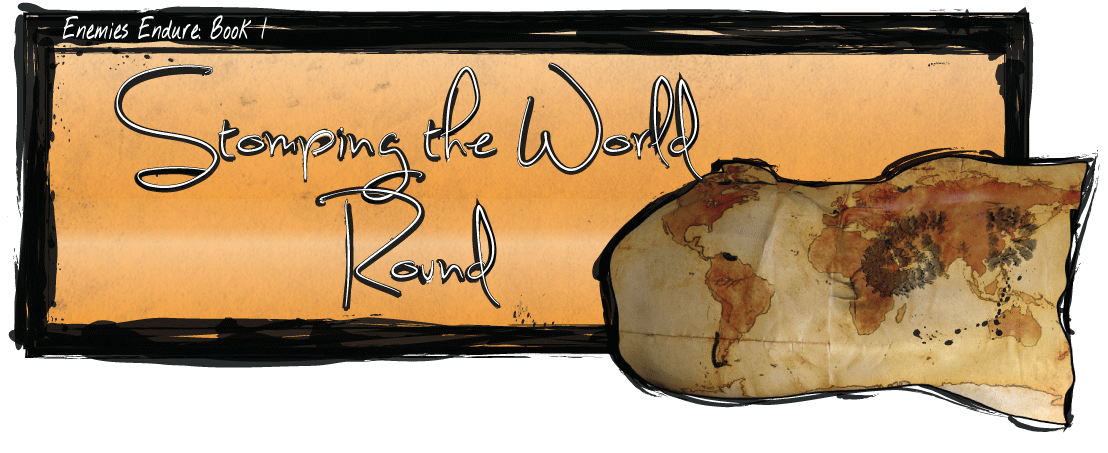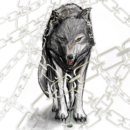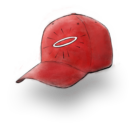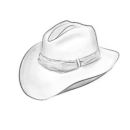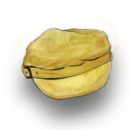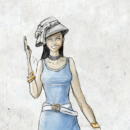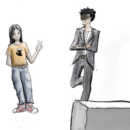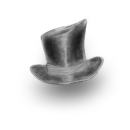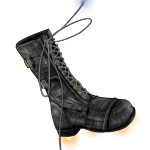– 2 –
It is bad to break free, for clarity, and raven across the world, if you are an eat-anything wolf. It might be OK if you are actually a raven. I don’t know. But if you are a wolf, then this thing is bad.
That is all that is left, I think, all that remains to bind it.
That you shouldn’t do that, Fenris.
That that thing is bad.
The Agency is ready, I think, if the wolf should get loose. They’ve bought weaponry from the svart-elves and consulted the House of Dreams. They’ve studied the corpse of the wolf named Skoll, the sun-eater, and they’ve searched for a similar wolf — Hati — whom they think must exist. A wolf that must be out there, somewhere, to eat such things as onions and the moon. A girl, they figure, since Skoll was a boy; they’re terrified that it’ll get out there and breed.
They’re ready, anyway, if giant wolves get loose.
There are armies that will strike, if the wolf breaks free of the constraints upon it.
There are forces of reason, and unreason, that will hunt it down.
It is bad, because such wolves are not allowed to have such freedom; it is bad, because it makes its wounds ooze and the wolf sicken and bleed; it is bad, because the world and its people ought not be eaten.
It is bad! The wolf shouldn’t!
But Fenris still strains and struggles against its blood-caked, svart-made cord.
– 3 –
Saul hurts for Edmund and not for Fenris.
He keeps seeing the wolf in his dreams but he doesn’t know the wolf is real; not yet. He doesn’t even really remember being someone who cares about Fenris; that was another life, and fourteen hundred years ago.
But Edmund —
Edmund is right there, and bound to that wolf, and hurting —
– 4 –
“He’s hurting,” says Saul. He clenches and unclenches his hand baffledly. “I don’t know what I’m supposed to do.”
Peter tilts his head to one side. “Is it gout?”
“It’s not gout,” says Saul.
“Hm,” says Peter.
They’re playing rummy. In between their words they flip cards about. The cards are special cards that will never get gout or suffer unnecessarily from storms at sea.
“Or storms at sea,” clarifies Saul.
“I don’t think you should help him,” says Peter. “On account of he’s a wicked thing.”
“Oh, since when,” says Saul.
He means, “since when do saints prejudge people?” Or “since when do saints apply that kind of criterion?”
Obviously there’s no point in asking when Edmund of Hunger went bad.
Peter sighs.
“You can’t help him, though,” says Peter, “because he’ll do bad things with that help. That’s the edge that the wicked things have. They can be kind to us, or mean to us; but we can’t hardly do much to them of anything but stand sadly by and watch. That’s why Bethany’s running around the world with the nithrid instead of attending to important saint business with us, you know. She couldn’t help Edmund!”
“That’s an oversimplification,” Saul says.
“Enh.”
“We could become saint-advisors,” proposes Saul. “We could lurk in the background behind wicked things and give them useful advice. Eventually they would internalize it and grow flowers of grace in their gardens of evil, at which point we’d smirk smugly at them, like so.”
“Like so?”
“Rummy,” says Saul. He spreads out the cards. He smirks smugly.
“If you can do that,” says Peter, “then I think you should do that. But if you can’t, then they make tofu that tastes like people.”
“What?”
“I mean, if you want to get him a gift basket —”
“I can’t just feed him tofu that tastes like people!” says Saul. “What if the tofu is secretly alive?”
“What?”
“Like, a tofu-person,” says Saul. “A tofu-person, that feels and bleeds and breathes and loves and lives like all the rest of us, until it’s slaughtered by the tofarmer and fed to beasts?”
“I don’t think you understand what tofu is,” says Peter.
“It wouldn’t matter,” says Saul. “It wouldn’t make them stop hurting.”
He looks away.
There’s just a little bit of blood from his nose. He rubs at it awkwardly.
“I have to stop,” he says. “I have to stop it. I can’t help them.”
He rubs at his hair. He gets blood in it. Somehow it just makes his hair look better. That’s his beatific hairstyling!
He is holy. He is the substance of miracles.
But he mutters, “I have to stop being a saint.”
– 5 –
That is how he has found himself here.
That is why he is hanging here in these rosebushes, now. Because he looked at Edmund and thought: I have to stop being a saint.
Because he remembered Fenris, dimly dreamt it, and thought: I have to stop being a saint.
It was not his best idea ever.
Now he is hanging in the rose-bushes. Now he is pinned there, like the victim of some shrike. Now there are flowers blooming all around him, bursting into life, red and —
He opens his eyes.
— dead white.
– 6 –
Inside him — inside it — there is a miracle.
It caresses it with the hands of its mind. It grins, white-toothed and pale, the Saul-beast. It has a miracle, a stolen miracle, a gem most precious, a jewel of red nothingness. It has smuggled o’er to the House of Hunger one of the treasures of the saints.
– 7 –
I’ve quit, Emily insists, but quitting’s difficult. She can’t sleep at night, or get through more than a few hours of the daytime, unless she has something yellow on her head.
When she does manage to sleep, she dreams troubled dreams.
Then she wakes up and she looks in the mirror and she sees Gotterdammerung staring back.
Because you failed, says the voice of obsession in her head. Because you stopped. Because you would not contain Tom and Cheryl and their folly. Because you would not contain Edmund and his hunger.
She tries to think of Sid and Sid’s new freedom but she can’t. Her thoughts are mazed.
She cries.
Her grades plummet. She seeks counseling but the school counselors cannot help her. They can only encourage her to study hard and kill really big wolves. (For legal reasons: if that’s what she, of course, independently, considers best.)
She wanders into a diner.
She orders lunch.
Lucy’s sitting there. Lucy’s casting the runes. She’s casting them over and over again and frowning like she doesn’t want whatever it is that the future holds.
She’s got a tiny little hat on. It’s kind of goofy. But it makes Emily, who’s replaced her own hat with the smallest of yellow hairpins, smile in solidarity across the room.
Lucy grins at her. Then Lucy scowls hatefully at her.
Lucy Souvante turns away.
Somewhere else, Harold has an insight. It’s an appalling insight that people shouldn’t have. He tries to write it down before it escapes him. It’s a complicated spiral of mathematics and ideas and he’ll lose it all if he forgets —
The call almost startles Emily to her feet.
She clings to the leg of her table. She shudders so as not to rise.
It is like elevator music in the air around her. It is like Barry Manilow ballading on the sitar. It is like a cheerful twanging, distant and strange. It is a ballad Emily hears not with her ears but with her heart.
It summons her. It calls her to go and stand in a creepy circle around Harold, to make sure that he darn well forgets.
She grits her teeth. She ignores it.
It pulls at her. Her face is white. She splashes her glass of water in her face, she gets ice in a chilly trail down her top and is quite afraid that she has ruined her makeup utterly, even though she hasn’t, and she tries so very hard not to heed the call.
She trembles.
She doesn’t run off to stand in a creepy circle around Harold.
Suddenly it occurs to her that possibly that is the meaning of Lucy’s runes. Lucy is, after all, a prophet. Possibly the world is going to go up in flames and die and be lost forever right now because Emily is sitting there and not answering the call. Possibly she is the worst person in the world ever. She has to go —
She is halfway out the door, and then she remembers that she hasn’t paid her bill.
She remembers that self-fulfilling prophecies that everything is going to be OK don’t make people frown in irritation and frustration.
She remembers Navvy Jim saying “You should not have your yellow, yellow hat, Emily, nor be in your yellow House.”
She drags herself, step by step, back to her table.
You should not have your yellow, yellow hat, Emily, nor be in your yellow House.
She shudders there. She sits.
After a while it recedes.
After a while there’s a different kind of call. She picks up her cell phone. She puts it to her ear.
“Yo,” she says.
“Emily,” Lirabelle disapproves. “You didn’t show!”
“I was eating,” she says.
“We missed you,” says Fred.
Emily squints at Fred.
“Fred,” she says, “I am trying to impose the context of a phone call on this conversation.”
“It’s a conference call,” he hand-waves.
“No,” she says.
“Besides,” says Fred, “just because some of us like to hold phones to ears while we talk to the rest of the House doesn’t mean I should respect it.”
“I just want you all to leave me alone,” Emily says.
She puts her head down on the table.
People are staring at her. They are angry that she is on a cell phone even though it didn’t ring audibly and she isn’t talking aloud. They are very aware that she is dripping water from the glass of it she splashed on her face and on her front. It embarrasses her.
“I just want to not have to do this any more,” she pleads.
“But then there will be Gotterdammerung,” Morgan points out.
“Yeah,” says Fred. “You don’t want to be responsible for the world ending when you could hang out with cool people like us instead, do you? That’s like getting hit by a boomerang up both ends!”
“‘Going both ways,’” says Emily. “The phrase is ‘going both ways.’”
“Enh,” says Fred.
Emily sighs.
“I just —” she says. “I just — you saw him, right? Sid?”
“It’s not our job to take sides between cannibals and . . . masochists?” says Fred, after a while.
“I saw,” says Lirabelle.
“Or rather, we’re on the side of the masochists! Go, Sid!”
“That’s just swell, Fred,” says Emily.
“You are a hard person to eavesdrop on,” says Saul, “you know.”
Emily looks up.
He’s seated across from her. He’s grinning. His teeth and his eyes are white. The power of his new House is in him. Somewhere the jangling sitar of the call rings out, louder and louder and more frantic.
Oh, God, she thinks.
For a moment she imagines that they will abandon her. For a moment she thinks that it is only natural and logical that because she waited out the last call, she will be eaten. Because she wears not a yellow hat but only a little yellow butterfly pin in her hair — that she will be eaten.
Naturally.
She has rejected them so they will not show —
But there is a miracle held to Saul: he is still graced, and so is she. As suddenly as the sight of a butterfly on a summer’s day, Fred is there; and Lirabelle; and Veronica; Morgan, too; all of them, all the members of the Keepers’ House.
Guys, Emily silents, in profound relief.
Don’t look at me, teases Fred. I am trying to impose the context of a TV show upon this intervention.
I’m breaking the fourth wall! she says, even though in fact she’s just looking out through the window glass at Fred.
They have drifted into the scene from unknown places. They stand outside the glass; against the bar; by the door. They watch events unfold.
Saul raps the table for her attention.
She thumbs her amplifier. She says, aloud, “I’d thought you were a saint.”
His face twitches.
“You keep track?” he says.
“I was a fan.”
“Hm,” he says.
He pulls out the salt and pepper shakers. He sets them on the table between the two of them. He smiles at her.
“Hello,” he says. “My name is Saul. I was sorted into the House of Hunger, but it was my second sorting; before that I was a saint. We were three; we were two; now we are one, and I think Peter shall not endure much longer. You have been a trouble to my brothers and sisters in Hunger. You stand around creepily and distract us when we want to eat. More importantly, you interfere with Edmund’s understanding and breaking the chain that holds Fenris Wolf.”
“That’s not true,” says Emily.
Hunger surges in his eyes. It’s like a blow. She shrinks back against her seat.
But, but, I was quitting, I was quitting —
“It is your turn to introduce yourself,” Saul says.
“My name is Emily,” she says.
Oh God, oh God, oh God.
“I was quitting,” she whispers.
Saul looks around.
“And yet they defend you,” he says. “How noble. How awkward.”
He bares his teeth. He moves, suddenly, towards Lirabelle.
Lirabelle is no longer leaning against the bar. Lirabelle is outside, on the street, on the other side of the street, still looking in.
Saul isn’t even out of his seat. He laughs.
“Please,” says Emily. “What do you want? I don’t want to fight you.”
“A long time ago,” says Saul, referring to late in the previous year, “a boy named Tom made a hat. He thought that he was making a hat to free his mind, but is his mind freed? No. So we can safely rule that out as his ultimate purpose. He made a hat, in order that the wolf could be unchained.”
Emily shakes her head.
Saul is quiet. He waits long enough for her to have a sudden thought; to lift a finger, as if to make a point —
He interrupts her. “You are thinking: but most of what the hat does has a different purpose, and it has created things that appear to actively oppose the freedom of the wolf.”
He rubs at the back of his head.
“I do wish they would stop staring,” he asides. “This is becoming very difficult.”
The pressure lightens for a moment. Fred pretends to be paying a great deal of attention to the specials, which are posted on the outside of the diner’s door. Morgan is tying his shoes. Lirabelle is on the phone.
“My,” says Saul.
Emily shrugs a little.
“Your point is irrelevant,” Saul says. “I will explain myself further: it is natural. It is natural for anything, for anyone, who is destined for a certain activity to spend a great deal of their time fighting it, denying it. It is . . . almost the nature of purpose, do you understand? To live, to strive, is to be your own worst enemy. Where we dream, where we hope, where we hunger, we push these things against the world. This forms a . . . limning. A rip. An edge. From that edge arise monsters: things which are opposing our purpose. Make a hat to free the wolf: create Sid, whose willing suffering helps chain it; make you Keepers in your yellow hats, whose staring eyes do the same. To act is to create opposition. — You see?”
He traces patterns in the table with his finger.
“The world demands that you be slaughtered and eaten,” he says, with a gentle smile. “But you struggle against that, and in so doing create such torments for yourself as ‘fear’ and ‘pain’ and ‘suffering.’ Will you live? Will you die? Either way you have bound yourself in your own boxes; created your own chains; given birth to your own enemies. It is not my teeth you fear but the shadow-self of your own dignity.”
She looks away.
“You offer your neck?” says Saul.
She glares back at him, and her eyes gleam gold, and he shudders. His thoughts fall into confusion. He grits his teeth. Then he finds a place of deep calm within him, under the gales of confusion, and says:
“I wanted to make you an offer.”
“No,” she says.
“Give up your suffering,” he says. “Lay down your power and your chains. Give yourselves to us; we will make an end to you; we will break the thing that makes you suffer, and your willingness will lathe away the pain. And then there will be no yellow House to bear witness to the wrong we do, and Fenris — no. Not Fenris. All bound and tormented, captive things. All our monsters, our hungers, and our prisoners, we will let them free.”
“No,” she whispers.
He reaches out for her. The hunger in him is drowning her. His hand is on her cheek, despite the glare of her. “Everybody wins,” says Saul, of the House of Hunger, and somehow that breaks the spell on her. Suddenly the fear in her tumbles past fear into a wild place of freedom and she grins at him, so brilliant and bright.
He winces. Her eyes burn like the sun.
Joy runs through her, and she leans in, and she tells him, very softly, “I don’t want to be eaten.”
“Pardon?”
“Don’t you get it? I don’t like you. I liked Sid. Sid was OK. But I don’t like you people and your ‘sometimes the way to free people is to kill them.’ I took off my own damned hat. I don’t need you. And I’ll be damned if I’m going to die at the maw of some hungry saint. I’m not going to be your lunch, Saul. Order a sandwich or something. They’ve got cheesecake. I — I’m going to live a long time, and dance the Thunder Dance, and die in a beautiful place, surrounded by something wonderful.”
He is too close. She grabs him by the ears. She slams his face into the salt and pepper, prompting an unpleasant bout of dizziness and sneezing. She flits to her feet.
He tries to get up but they are staring at him.
Their eyes are gold and they are dizzying him and he is struggling, he is staggering, he cannot remember who he is, where he is, there is something he is clutching, something he is holding tight inside him, something precious, but his spiritual hands, they start to slip —
“You have been corrupted,” Emily says. “You have been damaged by the hat, Saul. I’m so sorry, but you’ve been damaged. Your brain wasn’t a good fit for it. You weren’t a good fit for it. The hat doesn’t want to free the wolf. The purpose of hats isn’t to free the wolf. The purpose of a hat is to keep wolves bound.”
His head is ringing like a xylophone that somebody’s playing. His world is streaked with red, with yellow, and with white.
She is standing. She is turning. She is leaving. Saul cannot think —
Fred is gone.
Emily looks over sharply. Her brain cannot parse it.
Lirabelle is gone. Veronica is gone.
Saul clutches tighter at his miracle. His head begins to clear.
Morgan —
Run! screams Emily. She thumbs her marvelous speech amplifier. “Run!”
It booms across the block. People are scattering. The Keepers’ House disperses, leaving only Emily, Saul, and their dead; and, sitting on the floor, gnawing thoughtfully on Lirabelle’s arm, the Lucy-beast.
There is a burgeoning breath of pain in Emily. “I —”
“Ah,” says Saul. “I have backup.”
“I —”
“Thank you, Lucy,” Saul says.
Lucy waves a hand vaguely at them.
“What the hell,” says Emily. “What —”
Their lives were jewels.
She tries to say it. She can’t. She flicks the speech amplifier to maximum volume but there aren’t words in the human voice for this; not words in the human mind for this; she can’t express it. She just sniffles and mouths a silent wordlessness; then, far too quietly even for the speech amplifier to pick up, she speaks the names of her House’s dead.
Lucy walks over.
Lucy pats her on the head. Emily’s mouth twists. She is going to tell Lucy a secret. She is going to tell Lucy a brain-shattering secret, speak a forbidden name, shout it, even, leave her to writhe mindless and broken on the floor, and turn, and burst Saul’s mind —
But Lucy gets there first.
“I don’t think hats are for anything at all,” she says.
And Lucy is far away again. Lucy is smug, and safe, and she disdains Emily; and Emily’s vision pulses with white and gold confusion and she slumps against the diner’s bar.
A couple nights later, wandering aimlessly, eyes flickering between their normal blue and gold, she hears the Thunder Dance.
She slips in to the Konami Thunder Dance club. She watches Meredith duel with Paul.
There is magic in it and Emily’s eyes almost glow gold; almost suppress it, because that’s what she does, that’s what she can’t help doing, in her Keepers’ House.
Only, somehow, that’s left her. Somehow that’s all done. The Symbols stay Symbols. The world is full of change.
She can’t help wanting to bind it down to sanity, almost as much as she wants not to.
She can’t help wanting to bear witness to the idea that somehow, people using the Thunder Dance to hack the world with their footsteps is wrong, that it is bad, that people ought not do such things as dance the Symbol GRAVES and rouse up ghosts.
But she can’t, and she doesn’t want to, so she doesn’t. She relents. She just watches.
In the middle of the symbol GRAVES Meredith tries to slip in Dynamite.
Nothing happens.
Meredith looks embarrassed. She’s off her game. She had forgotten. That move was bug-fixed.
And Emily slips off to sleep there, among the unexploded spirits of her dead.
Non-Lethal Solutions
“Well-fought,” admits the Vampire King, sinking back into his coffin.
His eyes flutter. He stares up at the ceiling of the chapel.
He sighs.
“I picked my enemy well,” he says, sadly, to the Professor of Non-Lethal Solutions. “At least. I knew that if I targeted you, if I pushed you, if I fought you hard, then it would be you here, with me, at the end. If you won.”
“Yes,” Professor Campana confirms.
“I will sleep now,” says the Vampire King. “I will sleep, and in some future aeon I will wake and I will trouble the world again. No prison will hold me. No coffin can confine me. There is nothing that a Professor of Non-Lethal Solutions can do to me that will stop my eventual rise; my eventual triumph; the endless rivers of blood that will flow over this mortal Brentwood, when you and your pitiful magnet school of yours are gone.”
“Um,” says Professor Campana.
“You see, at last,” says the Vampire King, “the limits of your pathetic pacifism.”
“Um,” says Professor Campana again.
The Vampire King waves a hand airily. “Go ahead. Trouble me with your words. Then leave me to meditate in steel casing for all the endless years.”
“It’s actually a specialization in Chemistry,” Professor Campana explains.
– 1 –
In theory, the evil prophet of space would have a scroll of evil prophecy. It would speak of the things that were, and are, and will be.
She would brandish it to make an end to her enemies in this world.
It was to be waiting for her, at Mount Ararat, when she came to Earth. It was not waiting for her.
She uses an umbrella, and rock-paper-scissors, instead.
Over the holidays she visits the Bloody Cardinal. He’d been one of Maria’s targets — back when. Now he is a vampire curled up within his crypt.
She dramatically unfurls her umbrella in his direction.
BOOM.
She meets with Heather Steverns on the bridge that arches over Borit Lake. The wind blows. Their footing shakes.
“A long time ago,” Lucy Souvante says, “there was a contract on your family.”
Heather nods.
“My sister —” says Lucy.
“The Fan Hoeng?” Heather asks.
“Yes.”
“What happened?” Lucy says.
“She was a good woman,” says Heather Steverns. “She — oughtn’t have been in assassination.”
The wind rattles the bridge. The board that Lucy Souvante is standing on rips free and plummets. She hangs there, over the endless emptiness, using the power of evil prophesy.
“In the end,” says Heather, “I do not think that she could bring herself to kill my father Drake and me.”
“I see,” Lucy says. She starts to turn away.
Then she turns back.
“I want her,” Lucy Souvante says, and she is crying, “to have a record. Do you understand? I want people to look at her assassination record and say, ‘that was an awesome assassin, Maria. What a Fan Hoeng.’”
“Do not do this,” says Heather.
But Lucy is shaking her hand. She counts off one, two, three. She throws paper.
Heather has also thrown paper, but it does her no good.
She is no evil prophet, to hang in the air above Borit Lake without her feet under her. From the moment she has released one hand from the ropes to throw paper, she is lost.
The wind blows. She stumbles.
She falls and she is lost beneath the waters of Borit Lake.
“Paper beats humanity,” says Lucy Souvante.
She floats away.
There is an elephant — almost a mammoth, really. It is fond of its drink and fonder of human prey.
She nearly cannot bring herself to kill it, but she likes cash and its tusks are ivory.
She leaves it twitching and dead upon the ground.
When she sees a goat, of course, she kills it. Goats are dangerous and tricky creatures. But she has given up on finding a goat that is worthy of being her opponent.
That is what makes it so shocking when one day, she turns around, and there it is.
It is Christmas-time and the world is bright and magic. The wolf has broken free and there are festive Christmas scissors falling, now and then, through the air. The wolf-magnet has not quite activated —
Though it will have done, at any moment —
And she is nibbling on a candy cane as she walks.
Then bam.
An evil feeling!
Which is, of course, for an evil prophet of space, the best, most beautiful, most Christmas-y way to feel.
She turns, and she sees it.
On a certain floor, on a certain building, on a certain street, in Ipswich, there is a rock-paper-scissors playing goat.
– 3 –
The snake is coming for Cheryl, of course.
It is drawing nearer and nearer to her, even as the wolf struggles to tear its way free.
It is hunting her, and in good time it will find her, it will weave its will past her and the School’s various obfuscating defenses and it will strike her down.
One day she wakes up and there’s the head of a goblin shark in her bed and she knows it’s almost upon her.
Seagulls plunge down and fowl the satellite reception right in the middle of the season finale of Voltron Eternal, the House of Dreams’ favorite show — the series to top all series, where they both pilot robot lions and dance ballet.
It is coming.
– 4 –
As usual, it being almost Christmas, Martin puts Jane in a sack, drags her down to the basement, and shackles her to the wall.
“It’s so you don’t eat Santa!” he teases her, gaily.
He throws her homework and half a pizza in after her. Then he locks the door with seven locks!
“Spudgeflidgeon!” she rages. “Geffle-twonk! Glip! Glip!”
Martin leans against the door and sighs happily. Years of using invented curse words in her presence have finally paid off!
He straightens. He adjusts his goggles. He wanders about the house preparing for Christmas. Then he relaxes and he enjoys the marvelous silence of his home.
He reads a book.
He smokes a pipe. He spits out the pipe, hacking and coughing, and makes himself a big mug of the svart-drink instead.
After a while —
Since nobody’s watching —
He sneaks to his box of holding things. He plays with his classic Star Wars action figures. He cuts things that probably shouldn’t be cut with his cut-anything sword. If your power just went out I’m really sorry. That’s all Martin’s fault!
It’s not mine!
He takes out his stone. He puts in on his forehead. He traipses around as a billy goat, then as a small Godzilla, then as a number of other barnyard animals — tortoises, sheep, capybaras, and the like — and ultimately goes back to being a goat one more time.
It’s just so satisfying!
“Meh-eh,” he bleats.
Then it’s back to hanging up stockings and making the house more Christmas-y. He consults the scroll of evil prophecy to see if there’s anything else that must be done.
“Cinnamon!” he says. He bonks his forehead. He adds cinnamon to the apple cider that he’s brewing. He pours a little more along the edge of the window to keep out immortal and other, non-immortal, ants.
Then he sits back to think about presents.
“Time sheets,” he concludes. What little sister wouldn’t love the opportunity to sign in and sign out for chores around the house, scientific research, and high adventure? Plus, he’s been a little concerned that she might be indulging herself with a bit too much unauthorized overtime. Not under his roof she won’t!
He’s deep in the middle of the design — he’s a graphic designer —
When Lucy Souvante begins pounding at Jane and Martin’s door.
– 5 –
Cheryl’s House drives her to distraction, of course. They are . . . not sensible people. But even so —
The camaraderie in the House of Dreams is the best thing that Cheryl has ever known.
When Amber’s experiments started changing her — when you couldn’t touch Amber, not any longer, without being flung about at right angles to your initial approach — it could have been sad and frightful, but instead Cheryl and Amber had gotten into a vigorous, all-night discussion of life, death, and angular momentum. They’d come up with more ideas for the boot in that shared brainstorm than either had come up with in at least three weeks on their own.
When Tom’s reanimated deer-owl — his first attempt at bringing something “back” to life that hadn’t died as just one thing to begin with — tore loose and hunted the House of Dreams through their own secured installation, instead of everyone panicking, it became almost like a game . . .
She wakes up one morning, crying over the hurt of the paper serpent, and she suddenly realizes it. It suddenly hammers down on her, like a boot falling from space.
It isn’t just her. Not just her and guns and nukes off of Little Ganilly.
Tom’s hat has refined her into one thing, unique and apart from every other, but —
She isn’t alone.
“I think,” she says, and they’re all gathered there, all they of the House of Dreams, “that I am wound into it. That I’m part of it, that it’s of me.”
“Ouch,” says Amber.
“I think I am myself,” she says, “my own worst enemy.”
“Point of order,” interrupts Tom, who has never actually read Robert’s Rules of Order. “Won’t the term ‘worst enemy’ become utterly useless if we can apply it even to ourselves?”
“What?”
“E.g.,” says Tom. “Take a dog.”
Harold provides a dog. Tom blinks. The dog doesn’t vanish.
“That’s really disturbing, Harold,” Tom says.
Harold puts the dog away.
“What I mean is,” Tom says, recovering his equilibrium. “Take a dog conceptually. What is that dog’s worst enemy?”
“A cat?” Harold wonders, providing a cat.
“No!” says Tom, waving away the cat. “That very dog!”
“This is diverging from the core point of my presentation,” Cheryl says.
“No,” says Amber. “I get it! He’s totally right. Like, the dog can chase its own tail. But can it ever catch its own tail? It can’t! That’s not true for any other dog.”
“But if you shoot the dog,” Cheryl says, “because it has rabies —”
Everyone is looking at her.
She flails a hand.
“Spoilers,” sniffs Harold.
“I didn’t,” says Cheryl. “What. I didn’t even say I was talking about a particular movie.”
“Now I probably won’t even watch The Sixth Sense,” observes Tom, because the camaraderie in the House of Dreams is also the worst thing Cheryl has ever known.
“You can’t really watch the Sixth Sense,” Harold says. “You can only intuit it.”
“In space!” says Amber.
“I don’t think,” says Tom, verging with an awful suddenness back onto a previous conversational thread, “that the gun counts as the dog’s worst enemy, no. Or even the rabies. If the gun had the rabies, it wouldn’t be the dog’s worst nightmare but rather its salvation; ergo.”
“I see,” says Amber. “So what you’re thinking is, we should reserve the term ‘worst enemy’ for ‘worst enemy that is not actually yourself!’”
“Exactly,” says Tom. “Like, my worst enemy: my malfunctioning toaster! Otherwise, it would almost certainly be Tom. And yours, Amber, and Cheryl’s Cheryl, and so forth.”
“Still Keith,” Harold says.
Keith high-fives him. They’re enemy-bros.
“. . . fine,” says Cheryl. “I will use the terminology ‘In some fashion, my own efforts to destroy the paper serpent are simultaneously folding it into being. It is Ouroboros: its ending is its beginning, and I am trapped in the middle, between.’”
She sighs. She rests her head momentarily on the table.
“Hm,” says Tom.
“Hm?” Her head comes up.
“Then let us kill it!”
Cheryl is staring at him in shock. Tom is blushing. He stammers. He looks away.
“I mean,” he says, “let us help. Help. Not, not do it. Just, help.”
“It’s my enemy,” says Cheryl, hugging herself possessively. “I was just going to ask you for advice.”
“That’s my advice!” says Tom, recovering his savoir-faire. “Let us help you! I can even,” he says, brushing down his pants leg, “press the final button myself.”
She looks at him like he’s eating Christmas.
But he —
But they — They’re all so hopeful. Their eyes are shining. They’re like puppies, she thinks. Like puppies who don’t know what they shouldn’t be doing. Who don’t know eating Christmas is bad.
Finally, with a slow, grave reluctance, she nods. She gives in.
For the sake of the paper serpent.
“Fine,” she says.
She’ll allow her friends to ‘help.’
– 6 –
Sid and Max are facing off.
It’s old. It’s comfortable. It’s familiar. It’s new.
Sid scuffs the floor. It’s just a scuff, but he’s bought himself a pair of brand-new Nike Summoning Boots. They’re the best shoes in the world, if you want to scuff summoning circles with them.
One stroke across the floor, and his summoning circle is there, complete with a pentagram inside.
“Nice,” says Max.
Sid’s pentagram is glowing now. It’s shining with white lines springing up from the earth. There are all kinds of cool little details, including a little Sid logo. It’s the only logo that markets 100% Sid!
“Isn’t it?” Sid says. “I got a sponsorship.”
Max looks a little smug.
Max spreads his hands wide. Pillars of silver fire burst up from the ground and surround him. There’s a little angelic chorus, like there’s been a little angelic chorus, on their last few duels. It’s the joy of the substrate, resonating through the world, that it gets to see Max doing his stuff.
The world shivers all around him.
It pulses with light.
The song reaches its crescendo. It falls to silence. The other battles around them have gone still.
“Well played,” Sid admits. “Well played. But —”
Here he snidely uses psychological warfare:
“Not quite as loud as I’d expected, Max.”
Max laughs.
“Can’t bribe too many angels,” he says. “It’s a school night!”
He sweeps his longcoat dramatically. He spreads his arms: SNOWSTORM!
Clouds gather over his head. The snow fairy manifests. Snowflakes begin to fall all around Max. Max pushes at the air and the snowstorm flows over and dumps snow on Sid.
Sid shakes snow out of his hair.
Max intones, in the voice of a great summoner at work: “Snow — harder!”
But Sid is ready. He’s not going to be snowed out — tonight!
He draws a sword.
It’s a 21st century sword, and it’s made in Ipswich, so it isn’t really very good — but it is a sword. It’s sharp enough for this. He pokes it right into the cloud.
“Ow!” says the snow fairy.
The clouds swirl around. They’re just a little bit red.
Sid says: DON’T SNOW ON ME.
The snow fairy is now uncertain which magician to listen to. It attempts to hedge its bets.
“Perhaps you’re not familiar with the benefits of snow,” it says. “There are many! It’s cold and white and Christmasy!”
You can taste that Christmas spirit in the air!
“You might like snow,” the snow fairy proposes.
But Sid ignores this. He scuffs the floor again. There’s a dual summoning circle now.
He invokes Double Thing. DOUBLE THING!
It’s like a thing, but twice as much!
Half the double thing scrunges upwards from the earth. Half the double thing scrunges upwards from a different part of the earth. The double thing rumbles and shakes its double hands!
“That’s an . . . earth thing,” says Max, after staring at it for a bit.
“It’s four times the thing,” says Sid, proudly.
“I don’t want to fight,” protests the double thing.
“Ha ha!” laughs Sid. “But I want you to fight! You’re an ancillary in a magical duel. Now, stop that fairy from snowing on me harder, or we’ll both get chilly!”
The double thing doesn’t —
It doesn’t want to get chilly. So it oscillates until the fairy becomes confused.
“Is it one thing?” asks the fairy. “Is it two things?”
It becomes progressively dizzier as it tries to evaluate the situation. “No! One! Five! Seventeen! Eight!”
The fairy faints.
“That isn’t snowing harder,” says Max. After a moment, he adds, “That’s not even snowing smarter.”
“It’s snowing lower,” the double thing points out.
Sod-all Steve, who’s notionally the highest-ranked summoner (ever since Eugenie went to have a second word with Lucy about her ape), attempts to launch a surprise attack on the pair. He steps into the circle. He summons two SOD SPEARS to spear through Sid and Max. They pass through the domain of the oscillation.
So much for Sod-all Steve and his participation! He’ll be vibrating and rattling for quite some time.
Sid glances at him. He smirks. Then he turns back Maxwards.
“Now, double thing!” says Sid.
“Hm?”
“Attack!”
It looks at Sid. It hesitates. Then it looks speculatively at Max.
“But, I don’t really want to fight him,” says the double thing. “Look at him! Maybe you two should resolve this peacefully.”
Max sneers.
“I don’t want a double thing’s pity,” he says. He draws back. He readies himself to invoke SCRUBBING BUBBLE. It’s the battle magic that doesn’t actually help!
“It’s not pity,” says the double thing in frustration. It spits out bits of sod spear. “It’s not having an actual stake in the conflict —”
But Max ignores the double thing. He even interrupts its sentence!
SCRUBBING BUBBLE!
The wind screams down from the sky. The world flares up with red and purple light. Scrubbing bubbles bubble up from the earth, scrubbing ominous contrails through the air. Max shoves the magic with his hands. The bubbles scrub closer to Sid and the double thing.
It makes the floor so clean they can see their own reflections in it. It washes away Sod-All Steve and all his dreams. It removes the blood and dirt of ten thousand battles —
But it doesn’t help.
In fact, the double thing thinks, as it swarms towards Max and his summons, it’s probably the opposite of helping.
Sid is bloodied and tired when he wins at last. He is panting. He is gasping.
But he is, at last, the foremost of the summoners at the Lethal Magnet School for Wayward Youth. He has walked through fire and it has strengthened him. He has hardened his will in the gaol of the House of Torment and he has become something incredible.
He is laughing. He is hugging the tottering Max. His heart is dancing.
He alone will claim the Christmas Cup.
